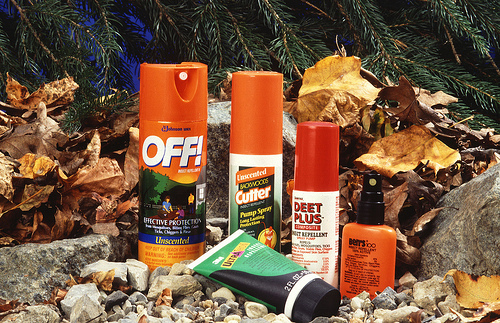The enemy of my enemy is my friend. That’s insect repellent for you.
- Insect repellents are a compound that is put onto a surface, typically the skin, to deter insects from the surface and the immediate surrounding area.
- ‘Insect repellent’ is also known as ‘bug spray’, and the best repellents ward off insects like mosquitoes, ticks, fleas, flies, and mites.
- Both natural and synthetic ingredient versions of insect repellents are available; however synthetic versions, in general, produce better results; and while ultrasonic technology has been experimented with as a form of repellent, studies have proven it to have a lack of effectiveness.
- Typically, insect repellents are available as an aerosol spray; roll-on liquid; a cream; or a gel, although some repellents are in the form of an object, like candles; wrist bands; mosquito coils; and clothing or nets typically treated with permethrin.
- Various communities have utilised natural insect repellents since ancient times, typically obtained from vegetation or other insects, or by burning a natural chemical or plant material.
Insect Repellents
Image courtesy of U.S. Department of Agriculture/Flickr
- Synthetic exploration of insect repellents began in the 1920s, and it wasn’t until 1944 when a particularly effective repellent was discovered, known as DEET (N,N-Diethyl-meta-toluamide also known as ‘diethyltoluamide’), first used by United States military in World War II; and it has been the main active ingredient in most repellents sold since the 1950s, due to its ability to deter most disease-ridden biting insects; its notable safety record; and its long-lasting effects.
- How insect repellents exactly repel insects is uncertain, although it is hypothesised that the repellents masks certain human molecules that are detected by and attract insects.
- While a product like DEET, in rare circumstances can cause undesirable reactions, it is considered fairly safe, especially in the adult population, however, insect repellent can be hazardous, especially if used for extended periods in high doses, and it may cause adverse effects to the human body, especially in very young children and potentially in unborn babies.
- Insect repellents can provide protection from three to twelve hours, with shorter lengths typically attributed to lower active ingredient concentrations, while longer times usually result from higher concentrations of the active ingredient.
- Substantially more effective insect repellents than the commonly used DEET are presently in testing processes, while the relatively new picaridin (also known as ‘icaridin’) has become a rival on the market; while lemon eucalyptus oil has been discovered to have an effectiveness similar to DEET, unlike the once commonly used citronella oil which needs reapplying every half hour or so to remain effective.
Bibliography:
A Brief History of Insect Repellents, Part 1, 2010, Incognito, http://www.avoidingbites.com/a-brief-history-of-insect-repellents-part-1/
DEET, 2016, Wikipedia, https://en.wikipedia.org/wiki/DEET
Insect Repellent, 2016, Wikipedia, https://en.wikipedia.org/wiki/Insect_repellent
Katz T, Miller J & Hebert A, Insect repellents: Historical perspectives and new developments, 2008, Journel of the American Academy of Dermatology, http://www.jaad.org/article/S0190-9622%2807%2901467-3/pdf
Keim B, DEET Mosquito Repellent Could Lose Its Bite, 2010, Wired, http://www.wired.com/2010/05/deet-resistance/







thank you for the information